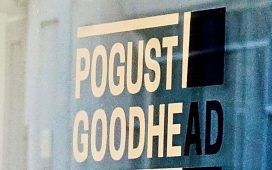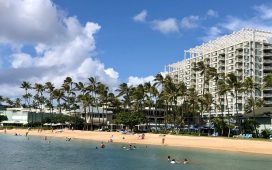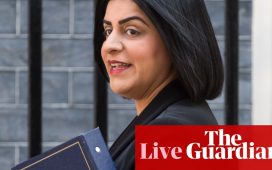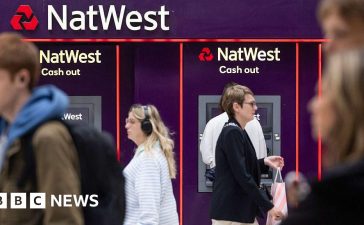After Elon Musk tapped the tweet button at 12.48 pm on 7 August 2018, a bunch of Tesla investors were about to be taken on a wild ride.
“Am considering taking Tesla private at $420. Financing secured,” read the tweet that has since stirred up more than four years of securities fraud litigation focused on the rampant tweeting habits of the electric automaker’s billionaire CEO.
Within one minute, the price of Tesla’s stock shot up by $8 a share and, by the end of that afternoon, the stock had climbed by more than $20 – a 6% – only to tank 10 days later when it became clear the $72m deal was not on the horizon at all.
This timeline, laid out by an expert witness in a 372-page filing in the case, is likely to be a crucial piece of evidence in the jury trial going on in a San Francisco courtroom, where Musk testified this week that his tweets may not have caused Tesla’s stock price jumps.
“Just because I tweet something does not mean people believe it or will act accordingly,” Musk told the jury in a San Francisco federal court Friday.
Legal and finance experts observing the case say Tesla’s attorneys face an “uphill battle” to make the claim that his tweet didn’t materially affect the price of the stock, which they say seems to be a key argument in the company’s defense against the shareholders’ charge that Musk cost them “billions” by misleadingly pumping up the stock price.
“This seems like a weak defense,” based on the timeline evidence entered into the court record by expert witness Michael L Hartzmark, said Josh White, an assistant professor of finance at Vanderbilt University, who is a former financial economist for the US Securities and Exchange Commission.
“Given how quickly Tesla’s stock price responded to the ‘funding secured’ Tweet, it seems that many investors believed this tweet to be a signal of Musk’s true intention to take the company private at a premium, which had a positive, immediate and sustained impact on the stock price.”
Proving that Musk’s tweets were “material” in causing investors to lose money on Tesla stock is one of three key legal points that attorneys for the investors must make to prove that what happened constituted securities fraud, legal experts said.
But, even before the trial began, the judge had already ruled that Musk’s tweets were both “false” and “reckless”, checking off two of those points in the investors’ favor.
Still, the investors’ attorneys must prove that shareholders were harmed by the tweets and then shed light on the question of whether Musk knew he was acting wrongly, which Loyola law professor Jessica Levinson said can be difficult to show.
“Those are real questions and not necessarily a slam dunk for the plaintiffs,” said Levinson, who nonetheless believes Tesla could face huge damages.
“It’s a class action lawsuit and there are a lot of different shareholders who claim they lost money,” she said. “And, if they can tie specific losses to those tweets, I think it could add up to potentially billions of dollars.”
‘Delete, don’t tweet’
After three days of sometimes combative testimony from Musk, the trial on Wednesday dove into how Tesla insiders had urged Musk to exercise control of his tweeting habits.
Weeks before Musk got into trouble after tweeting about his plans to take Tesla private, company investors had urged him to clamp down on his usage of Twitter, fearing that the comments he was posting were damaging the automaker’s brand as well as the company’s stock price, according to testimony presented Wednesday.
“If something really upsets you, go for a walk around the factory,” Ron Baron, a major Tesla shareholder, told Musk in a 15 July 2018 email that was displayed as evidence during Wednesday’s trial. “Get an ice cream cone. Just don’t use Twitter.”
Joseph Fath, a T Rowe Price portfolio manager, said he had warned Musk that his tweets were starting to do more harm than good for Tesla, following up with an email imploring him to “remember the golden rule. Delete. Don’t Tweet.”
Less than three weeks later, Fath said he was “shocked and surprised” to hear about Musk’s buyout tweet during a vacation he was taking in the Caribbean with his family. “It blew up my entire vacation,” Fath said.
In other testimony Wednesday, Antonio Gracias, who was the lead director on Tesla’s board in 2018, painted Musk’s tweets as a way of meeting “full disclosure” regulations, requiring that all shareholders be given inside company information at the same time.
But UC Berkeley law professor Robert Bartlett said Musk’s way of disseminating corporate news is so far out of the norm that it’s hard to see his tweets as not being very intentional.
“Musk plays by a different rulebook,” said Bartlett. “The standard practice in corporate acquisitions is you sit tight, you don’t make an announcement until (the deal) has been vetted. And then you do so through standard norms of making announcements of mergers such as through an investor relations office. You don’t go around parcelling out information in dribs and drabs.”
Levinson said, in a way, what’s on trial here is Musk’s management style of running his company by sending out thousands of quick, off-the-cuff and sometimes joking tweets.
“There’s a weird parallel to the way the former president (Trump) tweeted,” she said. “Right, ‘Oh, I just kind of tweet things really quickly and don’t take it too literally’.” She added that the jury would have to think about “how much is it fair to punish somebody for a quick tweet”.
Citing the timeline showing how quickly Tesla’s stock price jumped following Musk’s tweets, Levinson added “now in this case, that quick tweet did have a very real impact on people”.
San Francisco securities attorney Ramzi Abadou said in the end, the jury may weigh in on whether Musk is executing responsible management with his tweeting.

“The question is not whether or not people are going to believe his tweets, it is the question of him overlooking the fact that he’s got fiduciary duties to his investors,” he said. “I think it just goes back to his juvenile kind of approach to communicating over social media. I’m sure it drives his attorneys crazy.”
Companies only rarely take the risk of letting securities fraud cases go all the way to a trial. Normally, they are settled out of court. But Musk is essentially doubling down on his risk from the tweet. He and Tesla already agreed to pay a $40m fine in settling a case over the same tweets with the Securities and Exchange Commission in 2018, denying wrongdoing. Musk also surrendered the Tesla chairman position and agreed to let a company lawyer vet some of his tweets, as a result of that action. But he has appealed, saying he agreed to the settlement provisions under duress.
Since the current case is civil, Musk and Tesla can only face financial penalties. Even if damages are awarded, it’s hard to see them having much of an impact on Musk, who is one of the world’s richest men. Any penalties might be delayed for years by appeals.
White said the biggest risk Musk faces might be damage to his reputation, which has already been sullied by his failed attempt to get out of a deal to buy Twitter and his subsequent gutting of that company. Musk’s ownership of Twitter has proved unpopular with Tesla shareholders who worry about him being distracted. Tesla’s stock has lost about one-third of its value since Musk took over Twitter in October.
“If he loses this case, it adds to the reputation hit,” White said.









